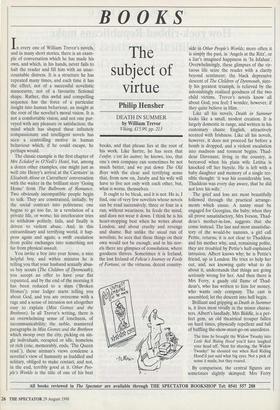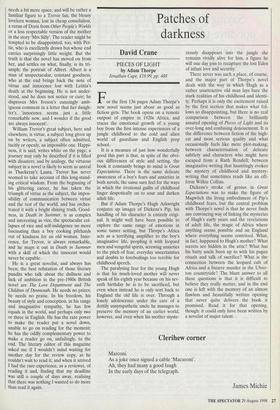BOOKS
The subject of virtue
Philip Hensher
DEATH IN SUMMER by William Trevor Viking, £15.99, pp. 213 In every one of William Trevor's novels, and in many short stories, there is an exam- ple of conversation which he has made his own, and which, in his hands, never fails to halt the reader and fill him with an unac- countable distress. It is a structure he has repeated many times, and each time it has the effect, not of a successful novelistic manoeuvre, nor of a favourite fictional shape. Rather, this awful and compelling sequence has the force of a particular insight into human behaviour, an insight at the root of the novelist's moral vision. It is not a comfortable vision, and not one pur- veyed with any pleasure or satisfaction; the mind which has shaped these infinitely compassionate and intelligent novels has seen a controlling motive in human behaviour which, if he could escape, he perhaps would.
The classic example is the first chapter of Mrs Eckdorf in O'Neill's Hotel, but, among a dozen other examples, one might just as well cite Henry's arrival at the Carstairs' in Elizabeth Alone or Carruthers' conversation with the waiter in the brilliant story 'Going Home' from The Ballroom of Romance. Two obviously incompatible people begin to talk. They are constrained, initially, by the social contract into politeness; one begins to go too far, in a revelation of a private life, or worse; his interlocutor tries to withdraw politely, fails, and finally is driven to violent abuse. And, in this extraordinary and terrifying world, it hap- pens again and again; a swift escalation from polite exchanges into something not far from physical assault.
You invite a boy into your house, a nice helpful boy, and within minutes he is telling you that your husband sexually abus- es boy scouts (The Children of Dynmouth); you accept an offer to have your flat repainted, and by the end of the morning it has been reduced to a slum (`Broken Homes'); your lodger starts telling you about God, and you are overcome with a rage and a sense of intrusion not altogether easy to explain (Miss Gomez and the Brethren). In all Trevor's writing, there is an overwhelming sense of loneliness, of incommunicability; the noble, mannered paragraphs in Miss Gomez and the Brethren which swoop over the city, picking on sin- gle individuals, occupied or idle, homeless or rich (one, memorably, ends, 'The Queen read.'), these airman's views condense a novelist's view of humanity as huddled and solitary, obliged to make contact, and not, in the end, terribly good at it. Other Peo- ple's Worlds is the title of one of his best books, and that phrase lies at the root of his work. Like Sartre, he has seen that l'enfer, c'est les autres; he knows, too, that one's own company can sometimes be not much better, and we put down The Old Boys with the clear and terrifying sense that, from now on, Jaraby and his wife will have to live not only with each other, but, what is worse, themselves.
It ought to be bleak, and it is not. He is, I find, one of very few novelists whose novels can be read successively, three or four in a run, without weariness; he feeds the mind, and does not wear it down. I think he is his heart-stopping best when he writes about London, and about cruelty and revenge and shame. But unlike the usual run of novelists, he sees that these things on their own would not be enough, and in his nov- els there are glimpses of consolation, where goodness thrives. Sometimes it is Ireland, the lost Ireland of Felicia's Journey or Fools of Fortune, or the virtuous, decent country- side in Other People's Worlds; more often it is simply the past, in 'Angels at the Ritz', or a liar's imagined happiness in 'In Isfahan'. Overwhelmingly, these glimpses of the vir- tuous life seize the reader with a clarity beyond sentiment; the black depressive descent of The Children of Dynmouth, sure- ly his greatest triumph, is relieved by the astonishingly realised goodness of the two child victims. Trevor's novels know all about God, you feel; I wonder, however, if they quite believe in Him.
Like all his novels, Death in Summer looks like a small, modest creation. It is largely domestic in range, and written in his customary chaste English, attractively scented with Irishness. Like all his novels, however, it does not proceed far before a bomb is dropped, and a violent escalation into madness and torment begins. Thad- deus Davenant, living in the country, is bereaved when his plain wife Letitia is knocked off her bicycle. He is left with a baby daughter and memory of a single ter- rible thought: 'it was his considerable loss, Thaddeus was every day aware, that he did not love his wife.'
The grief and loss are most beautifully followed through the practical arrange- ments which ensue. A nanny must be engaged for Georgina, the baby; when they all prove unsatisfactory, Mrs Iveson, Thad- deus's mother-in-law, suggests that she come instead. The last and most unsatisfac- tory of the would-be nannies, a girl call Pettie, returns; it is not clear to Thaddeus and his mother why, and, remaining polite, they are troubled by Pettie's half-explained intrusion. Albert knows why; he is Pettie's friend, up in London. He tries to help her out, and, not knowing quite what to do about it, understands that things are going seriously wrong for her. And then there is Mrs Ferry, a gaudy old flame of Thad- deus's, who has written to him for money, who wants only company. The cast is assembled; let the descent into hell begin.
Brilliant and gripping as Death in Summer is, it lives most vividly in the minor charac- ters. Albert's landlady, Mrs Biddle, is a per- fect gem, an old theatrical trouper fallen on hard times, physically repellent and full of baffling the-show-must-go-on anecdotes.
The time he brought the Widow Twanky into Little Red Riding Hood you'd have laughed your head off. 'Next for shaving, the Widow Twanky!' he shouted out when Red Riding Hood'd just said what big eyes. Not a pick of sense it made, but they roared.
By comparison, the central figures are sometimes slightly skimped; Mrs Ferry needs a bit more space, and will be rather a familiar figure to a Trevor fan, the blousy lovelorn woman, lost in cheap consolation, a rerun of Doris from Other People's Worlds or a less respectable version of the mother in the story 'Mrs Silly'. The reader might be tempted to be disappointed, too, with Pet- tie, who is excellently drawn but whose end carries surprisingly little weight. But the truth is that the novel has moved on from her, and settles on what, finally, is its tri- umph; the portrait of Albert. Albert is a man of unspectacular, constant goodness, who at the end brings back the note of virtue and innocence lost with Letitia's death at the beginning. He is not under- stood, and he does not notice or care; he disproves Mrs Iveson's cunningly amb- iguous comment in a letter that her daugh- ter's 'innocence seems just a little remarkable now, and I wonder if the good are always innocent'.
William Trevor's great subject, here and elsewhere, is virtue, a subject long given up on by writers, a subject often admitted, tacitly or openly, an impossible one. Happi- ness, it is said, writes white on the page; a journey may only be described if it is filled with disasters; and by analogy, the virtuous subject in a novel is likely to seem as unreal as Thackeray's Laura. Trevor has never seemed to take account of this long-stand- ing critical wisdom. From the beginning of his glittering career, he has taken the triumph of virtue as the subject, the impos- sibility of communication between virtue and the rest of the world, and has orches- trated it with a bright shining truth. Good- ness, in Death in Summer, is as complex and interesting as vice, the spectacular col- lapses of vice and self-indulgence no more fascinating than a boy cooking pilchards out of kindness for an old woman. Inno- cence, for Trevor, is always remarkable, and he maps it out in Death in Summer with a skill of which the innocent would never be capable.
He is a great novelist, and always has been; the best refutation of those literary pundits who talk about the dullness and lack of ambition in the pre-1980s British novel are The Love Department and The Children of Dynmouth. He needs no prizes; he needs no praise. In his freedom, his beauty of style and conception, in his range and imaginative sympathy, he has few equals in the world, and perhaps only two or three in English. He has the rare power to make the reader put a novel down, unable to go on reading for the moment; he has the oddly complementary power to make a reader go on, unfailingly, to the end. The literary editor of this magazine asked me if I wouldn't mind waiting for another day for the review copy, as he couldn't wait to read it; and when it arrived I had the rare experience, as a reviewer, of reading it and, finding that my deadline was still a couple of days away, realising that there was nothing I wanted to do more than read it again.



























































 Previous page
Previous page